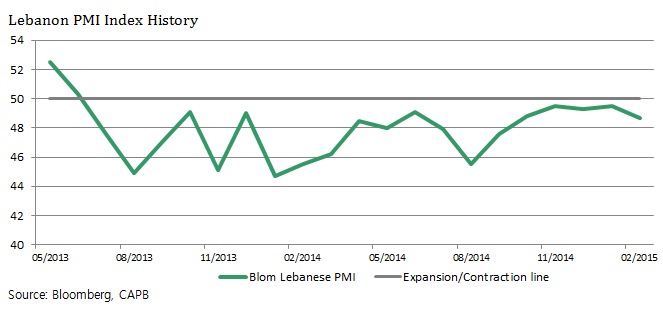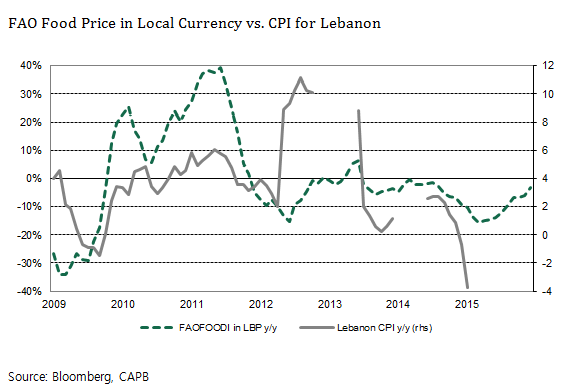PHOTO
According to the latest Macro report from CréditAgricole Private Banking
•Improvement in PMI Lebanon employment figures in spite of lower global data
•Lebanon is escaping the recession and capitalizing on its US dollar peg
•Lower headline inflation rate can be witnessed during recent months
The latest CréditAgricole Private Banking research report, 'Macro Comment - Lebanon Update', remarked that employment level rises in Lebanon despite subdued economic activity.
"There was a gain in Lebanon employment numbers in spite of lower PMI data resulting from declining new business and output levels. Such PMI levels also led to lower input prices and labour costs which finally resulted in declining prices charged by firms", said Dr. Paul Wetterwald, Chief Economist, CréditAgricole Private Banking.
The February PMI index in Lebanon displayed one more below-50 mark, extending its contracting streak to twentieth months. Most of the series figures lay below the contraction/expansion frontier line. At 48.7, the pace of contraction deteriorated further from the January level (49.5).
The message conveyed by this index differs from the 2014 Banque du Liban GDP growth estimate (around 2%) and 2015 IMF forecast (2.5%).
Dr. Paul Wetterwald continued, "Furthermore, it can be noted that Lebanon is escaping the recession and capitalizing on its currency's peg to the US dollar. We can recall that the Banquedu Liban (BDL) de jure exchange rate regime is free floating. De facto, the Lebanese pound rate of conversion to the US dollar remains within a very narrow band. In this context, we can name it an exchange rate stabilized arrangement, anchoring the pound to the dollar. It is generally known that despite daily interventions, the BDL does not publish intervention data.
Capitalizing on the Lebanese pound's peg to the US dollar, the energy and food price components have contributed to lower the headline inflation rate during recent months. The latter has declined to -3.8% year-on-year in January, but it remains to be seen whether this will hold true over the year-end horizon."
Assuming the oil price (WTI) at the end of December 2015 to be the same than today, then the year-on-year variation expressed in USD will move from -50% to -4%. In other words, oil will contribute positively to inflation in Lebanon at constant exchange rate.
Taking into account the Lebanese pound exchange rate and the USD food price variation, itallowsto compute a yearly rate of change of the food price in the local currency, and then to compare it with the consumer price inflation. Assuming that the current USD food price and exchange rate remain the same until December 2015, results in a yearly food price change which will be slightly higher than the most recent change. This assumption is illustrated by the dotted line values between now and December 2015 in the graph below. The positive difference between the current rate of food price change and the December one means that there will be some contribution to inflation stemming from the food prices.

Dr. Paul Wetterwald added, "Given the advantage stemming from the peg's existence, namely adding a pinch of stability against a very uncertain outlook, one can't help wonder whether that mechanism is at risk. First of all we have to note that Lebanon did not ask for assistance from the IMF to provide foreign currency during the recent crisis. Besides, it is true that the public debt outlook worsened significantly. However, the amount of public debt denominated in foreign currencies has stabilized since May 2013. Comparing the amount of currency reserves held by the central bank to "traditional" metrics to gauge the robustness of the Lebanese position does not look worrying."
According to the Banque du Liban (BDL), "the public debt is expected to rise again in 2015 by about USD 4bn. The debt-to-GDP ratio has risen from 130% to about 143%".
As shown in the graph below, the reserves level stand well above the various variables taken into consideration, i.e. the value of three months of imports, twenty percent of the M2 monetary aggregate, and one hundred percent of the foreign currency public debt.
Foreign Currencies Reserves vs. "Traditional" Metrics (billions of LBP)
Dr. Paul Wetterwald concluded, "The Lebanese economy displayed some encouraging figures with gains in employment numbers, lower headline inflation and stable currency reserves. This is the positive side of the story but there are many challenges which are still confronting Lebanon. Whilst there is a ray of positivity, economic indicators like PMI data is still low."
-Ends-
About CréditAgricole Private Banking
CréditAgricole Private Banking comprises all of the CréditAgricole Group subsidiaries specialised in wealth management. Backed by the financial strength of the CréditAgricole Group, CréditAgricole Private Banking has operations in all the major international financial markets:
- Europe: France, Belgium, Spain, Italy, Luxembourg, Monaco and Switzerland
- Asia: Hong Kong and Singapore
- Middle East: Abu Dhabi, Beirut, Dubai.
- Americas: Brazil, Miami, Uruguay.
CréditAgricole Private Banking employs over 2,600 people in 15 countries and manages over €100billion in financial assets, which places the group among the leading European players in the sector (December 31, 2014).
For more information, visit www.ca-privatebanking.com
About CréditAgricole (Suisse) SA
A subsidiary of CréditAgricolePrivate Banking that operates under this brand name for its wealth management activities. CréditAgricole(Suisse) SA, Geneva-headquartered company, is one of the top-five foreign banks in Switzerland in terms of client wealth, total assets and shareholders' equity. With some 1,400 employees, CréditAgricole(Suisse) SA has three branches in Switzerland - Lausanne, Lugano and Zurich - and numerous international private banking business locations, including Abu Dhabi, Beirut, Dubai, Hong Kong, Montevideo and Singapore.
For more information, visitwww.ca-suisse.com
Media Contacts:
FTI Consulting
ManashBhuyan, +971 50 8419631, manash.bhuyan@fticonsulting.com
Tamara Khoury, +971 56 3485507, tamara.khoury@fticonsulting.com
CréditAgricole Private Banking
Julie Castille, +41 58 321 9103, julie.castille@ca-suisse.com
Melinda Raverdy, +41 58 321 9597, melinda.raverdy@ca-suisse.com
© Press Release 2015




















